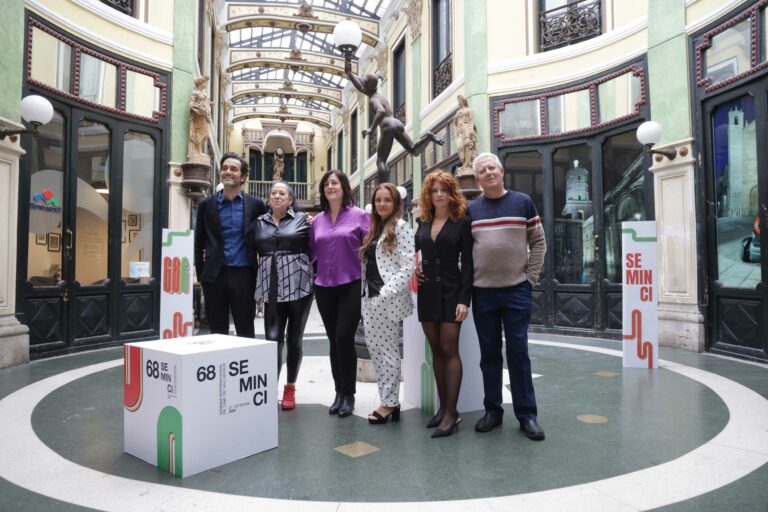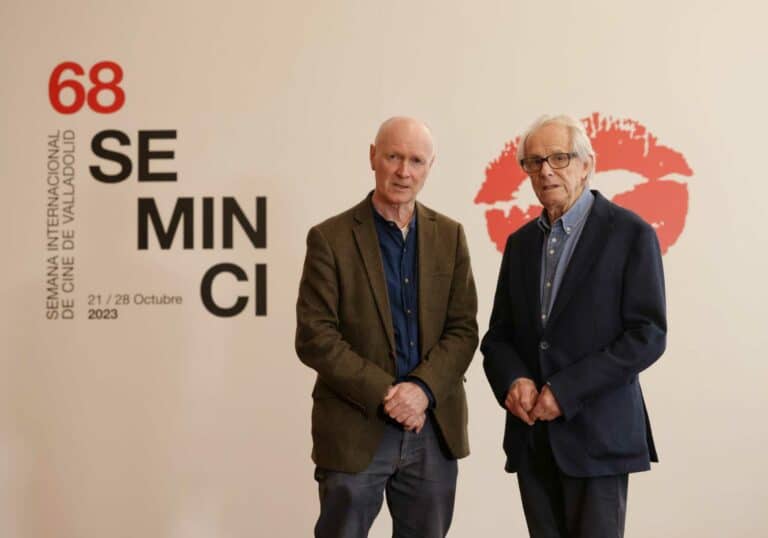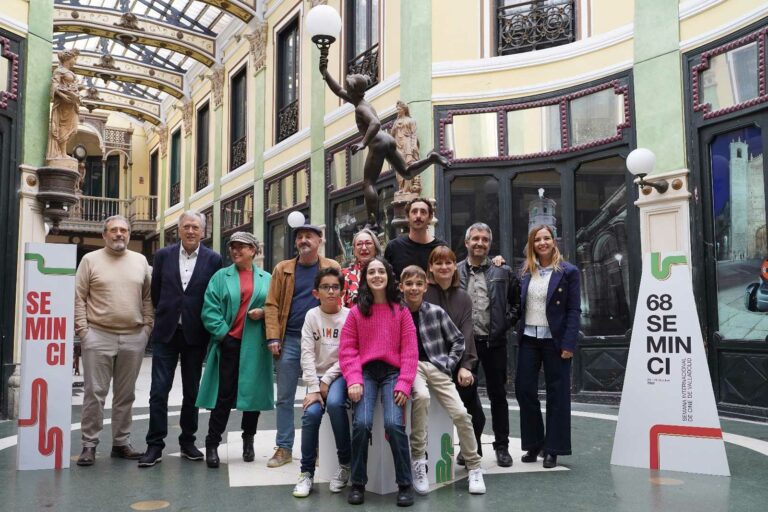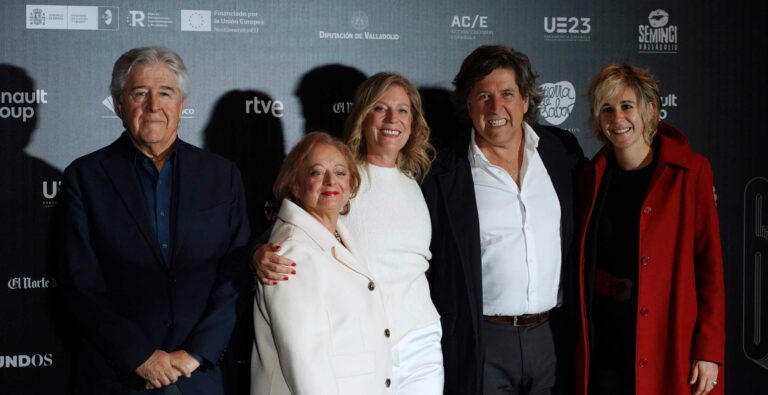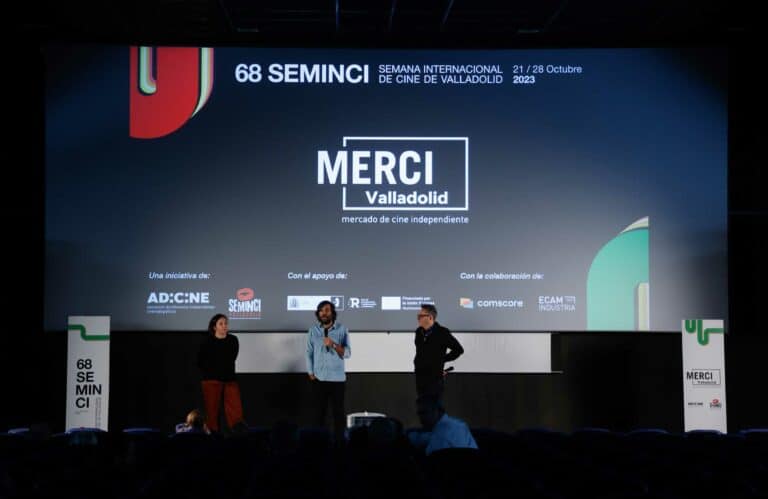“It all started when I saw Fahrije Hoti’s story on television. I knew actress Ylka Gashi, we had worked together on a short film, and I suggested that she travel to that Kosovar village to meet the real character. When we talked to Fahrije, her life, her character, she inspired me so much and impressed me so much. While I was talking to her, I felt that this was not just another film for me, that it was my duty to convey the story and the life of this strong woman.” Director Blerta Basholli appeared this Wednesday, October 27th 2021, in the Hall of Mirrors at Calderon Theatre to present Hive, a film based on the Fahrije Hoti’s story of overcoming challenges, whose courage exemplifies that of so many women forced by circumstances to seek ways of survival in a chauvinistic, hostile and war-torn environment.
Accompanied by actress Ylka Gashi and producer Yll Uka, the young Kosovar director stressed that it was great for her that Ylka wanted to be part of the project. “We shared it, we lived the story together, we thought a lot about the character and about the film. And that work that we did together was very important for the project itself.”
In her first feature film, Blerta Basholli tells the true story of a Kosovar widow who tries to get ahead and set up a small food business in her war-slaughtered village, for which she will have to face a chauvinistic and patriarchal society.
“Before making the film we spent a lot of time with Fahrije and the village women. What happened there was very hard, they lost a lot of people, the women lost family members, husbands, fathers, sons, friends… They were trying to recover from that trauma, but at the same time they were living in a patriarchal society. In real life it was much harder than what you see in the film, it was very, very hard,” the filmmaker explained. “The women, at the beginning, even resisted Fahrije’s project, and that happened for several reasons: because of the society they lived in and because they were very traumatised. Fahrije had to fight against patriarchy and against the resistance of many women who did not want to join her, and the process was quite long and difficult… However, on the last visit we made to Fahrije’s factory we saw that there were about a hundred women working there and that they form a good community, although it all took time.”
Actress Ylka Gashi, who plays Fahrije Hoti, recalled that the project, since the idea of making a film came up, had taken them quite a long time, about eight years in total: “Fahrije was an inspiration for us, as artists and as women. We really wanted to honour her figure and her character, and we took the project very seriously, which was very hard because it touched us personally.”
For Gashi, who had a few supporting roles in films shot in Kosovo after the war, this was her first leading role in a feature film. “I fell in love again with acting and the profession, because I fell in love with this story, we put a lot of love into our work. In Kosovo it’s quite normal for there to be a connection with the story, because we all know what happened, but when we see the impact the film is having in other countries we are very happy that the international audience connects and understands what happened. We have also seen that, after the screenings, there are many searches on Google to see who Fahrije is, what ajvar is…”
Producer Yll Uka, meanwhile, noted that he had joined the project some six years ago. “Blerta Basholli showed me the first draft of the script, and I loved it. We received support from the Kosovo Film Commission and other countries, because in the end this film is a co-production between four countries.” On the situation of cinema in Kosovo, Yll Uka said that during the last eight or ten years they have been working very hard, supporting many productions. “A lot of films have been made, which are successful, winning recognitions and awards in festivals all over the world. In Kosovo there are a lot of interesting stories to tell, and this opens the doors a little bit. Next year we have been promised that the budget to support films will be doubled, so we have quite a lot of expectations and are excited.”
On the fact that Hive has been selected to represent Kosovo at the Oscars – among other awards the film has already received three awards at the Sundance Festival – Basholli said she felt “honoured and very happy”: “At the beginning we weren’t thinking about those things, but about how to tell and transmit the story. But the repercussion has been very positive, it has been at many festivals, I am very happy to be here at Seminci, especially… And the fact that our film was selected for the Oscars has been like a reward. We hope it’s successful.”
Hive will be released in Kosovo in the next few days. “Fahrije and a friend of hers have already seen it and they are very happy. In fact, Fahrije has accompanied us on some trips to present it, although right now she is very busy with the factory and on this occasion she could not come to Valladolid. I hope that when the rest of the women in the village see it, they will like it too,” said Basholli.
The film will be screened this Wednesday 27th at 22.00h in the Calderón and Carrión Theatres, and tomorrow Thursday 28th at 16.30h.



